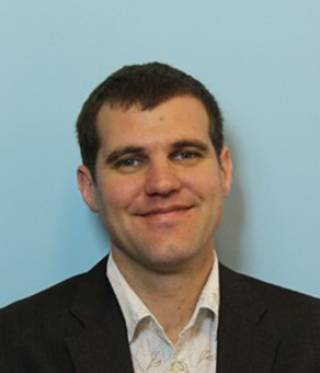I am interested in how the climate evolved in the past and will do so going into the future.
- More about Professor Brierley
Like the climate, my career path has steadily evolved since its start in physics (BSc, Durham, 2002). I then studied coupled climate modelling (PhD in Meteorology, University of Reading, 2007), which combines physical oceanography with atmospheric physics. A post-doc in the Geology & Geophysics department at Yale exposed me to the true scale of Earth's history.
I have been at UCL Geography since 2011 when I was brought in to launch two MSc programmes: in Climate Change and Environmental Modelling. I was promoted to Senior Lecturer in 2016 and was rebranded as Associate Professor in 2018. I am still in charge of the MSc Climate Change. and am involved in the London NERC DTP. I was the Department's inaugural Careers & Academic Support Tutor from 2017-2019.
- Teaching
I teach on the following modules:
- Models in Environmental Science (GEOG0109)
- Climate Dynamics (GEOG0118)
- Climate Modelling (GEOG0121)
- Publications
To view Professor Brierley's publications, please visit UCL Profiles:
- Research Interests
The Earth is heading to a climate state not seen in the history of our species. The climate models we use to make projections of that state contain considerable uncertainty. I try to understand, reduce and quantify this uncertainty. Identifying why climate has changed in the past can help us understand the range of its future changes. This is especially true of past warm periods and my particular choice is the Pliocene (around 5-3 million years ago when CO2 levels were last at their present, elevated ones).
Uncertainty in Climate Observations and Projections
- I am working with colleagues in UCL Statistical Sciences to develop improved techniques for uncertainty quantification of climate observations (Ilyas et al., 2017)
- Using emergent, observational constraints on future projections (Ho et al., 2015, is the first attempt to apply this approach with hydrological models)
- Characterising the uncertainty in ocean models from physical parameters (Collins et al., 2007; Brierley et al., 2010
Climate of the Pliocene
- A vast pool of warm water encompassed the majority of the tropical ocean in this period (Fedorov et al., 2013). resulting in a weak atmospheric circulation (Brierley et al., 2009)
- Mechanisms behind this warm pool could involve tropical cyclone feedbacks (Fedorov et al., 2010), rather than inter-ocean gateways (Brierley & Fedorov, 2016)
- I reviewed both the relevant chapter of the Intergovernmental Panel of Climate Change and the plans for the next stage of the Pliocene Model Intercomparison Project
Past Climate Variability
- Co-Chair of Past2Future Working Group of the Palaeoclimate Model Intercomparison Project (PMIP; Kageyama et al, 2016)
- The PMIP Var Data website has images and data of climate variability for all the PMIP3 models
- Behaviour of the El Niño – Southern Oscillation (ENSO) in the Pliocene (Brierley, 2013 & 2015)
- South American climate variability (Brierley & Wainer (2018); as part of the international PACMEDY consortium)
Early human-climate interactions
- Pastoralism in northern Africa during the mid-Holocene (Brierley et al. 2018)
- The impact of the Native American depopulation on the global carbon cycle (Koch et al., 2019)
- East African climate changes over the Plio-Pleistocene and their consequences for Human evolution (Maslin et al., 2014)
Hurricanes and Climate Change (reserved for student researchers)
- Joon Koh (MSc, 2013) performed the first study comparing cyclone formation in both past and future climate projections (Koh & Brierley, 2015)
- Joshua Studholme (BSc, 2013) objectively identified instances of cyclones exiting the tropics (Studholme et al., 2015)
- Mark Muetzelfeldt (MSc, 2013) developed a machine-learning hurricane-tracking algorithm for model simulations
- Impact
Climate change is a global problem that needs urgent action to safeguard our future. My research just really diagnoses the problem we face, rather than providing a part of the solution. I see that the biggest contribution I can make is through using my expertise to educate others and raise awareness of the issue. This has led me to engage with the public through a series of conventional science education activities. The most substantial of these have been teaching at geography 'A' level revision courses and a short course at the Royal Institution that ran in both 2013 and 2014. I have also helped the Royal Meteorological Society produce award-winning, school resources about past climates.
I aim to be generous with my time to field scientific questions be they from large institutions (such as the BBC or the UK Government) or individuals. This has led me to fielding media enquiries (mainly to print journalists, but I have appeared on the national news).
As well as personally talking about climate science, I've been thinking about the best way that dialogue should take place. Firstly, where possible it should actually be a bespoke dialogue rather than an information-deficit barrage of facts. This has led me to be involved with a policy commission based at UCL. We have given evidence to Parliament and authored a cross-disciplinary report on the topic. This work has been folded into a training workshop for PhD students at the London NERC DTP.
- Research Students
Primary Supervisor
- Damian Oyarzun Valenzuela, "Climate change and air quality in the Atacama Desert" [Funded through CONICYT, with Neil Rose as second supervisor]
- Anni Zhao, "Pliocene climate and SST gradients"
- Zhiyi Jiang, Hurricanes and Climate Change
Secondary Supervisor
- Clair Barnes, "Statistical post-processing of weather forecasts" (supervised by Richard Chandler in UCL Statistics)
Lab Alumni
- Alexander Koch, Former PhD student. "Pre-Columbian agriculture and markers of the Anthropocene" [Funded through the London NERC DTP, with Simon Lewis as second supervisor]
- Sabela Regueiro Sanfiz, Former Postdoc Speleothems and South American climate
- Maryam Ilyas, "Sparse, fitted empirical orthogonal functions for climate reconstruction" (supervised by Serge Guillas in UCL Statistical Science)
 Close
Close


